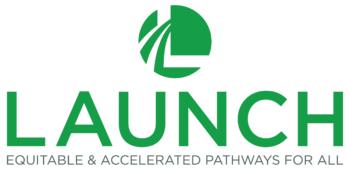A Clear Vision and A Shared Commitment: LAUNCHing Equitable Access to Pathways

ESG is excited to be part of a major new initiative to drive economic development and mobility by expanding educational pathways—Launch: Equitable & Accelerated Pathways for All. Make sure to check out the press release and the new Launch website to learn more about the work, and read on for ESG Director Casey Haugner Wrenn’s perspective on why we need this type of bold, collective action at a critical moment for both students and economies.
Growing up in Mountain Pine, Arkansas – a tiny, rural logging community – meant lots of time outside as a kid. I made mud pies, went fishing, and raced wax paper boats down the creek with my friends. I didn’t have a schedule full of activities or lots of places to visit. There was plenty of time to look up at the sky and think. I often dreamed about what I wanted to be when I grew up. Besides the (now defunct) Weyerhaeuser mill, there wasn’t much for me to see for myself. I decided I wanted to be a “businesswoman,” but in truth, I had no idea what that meant. I knew people got paychecks, and I thought for sure someone in a big building somewhere must have to sign them. But how to get the momentum to launch me all the way there? I had no clue.
When I asked adults in my life how I could get where I wanted to go, there was only one answer: “You have to go to college!” But none of my friends’ parents had gone, there wasn’t a university close by, and all I knew about college was what I could pick-out watching SEC football games on Saturday afternoons (Go Hogs!). How could I gain clarity on the career I wanted? Were there opportunities in high school for me to try out my interests? What path would take me from high school to my dream job? Finding my way to (and through) a university in another state to get a business degree was a convoluted journey with lots of barriers to overcome – shepherded by a complex network of extended family members, friends from other school districts, and mentors I was fortunate to learn from along the way.
I wish I could say that the experience of today’s students is much different, that they have access to the world at their fingertips (or on their smart phones) and can see whatever job they want, getting instant answers about how to get there. But my experience as a mentor for high school seniors in my neighborhood the past nine years has taught me not enough has changed. In fact, the pandemic has put even more hurdles in front of our students, a third of whom aren’t on grade level as they enter high school and try to build momentum for whatever will be next.
Many students – and even many whole communities – find themselves at the intersections of life without a clue about which way to turn to get where they want to go. What happens when you graduate high school? What happens when the mill shuts down? The path to prosperity, to economic stability, is incredibly unclear. Do we need a certificate, two, or four-year degree? An apprenticeship? What major? Will that cost too much? Will credits transfer if we start at the local community college? What about nabbing that dream job or recruiting a dream employer?
As a native of the state, I was so inspired to read about Jaylen Smith, an 18-year old who was recently elected Mayor of Earle, Arkansas. Earle is a delta community with a shrinking population (only 1,800 – not too much larger than Mtn. Pine). Amidst a complex picture of economic and community trends, Jaylen’s vision for his town is crystal clear. He wants to recruit a supermarket back to Earle – which will bring jobs, healthy food, connection, and hope. In a recent interview Jaylen paraphrased his favorite Bible verse, Habakkuk 3.2: you’ve got to “Write a vision, and make it plain.” He’s right.
A plain vision is too often what we lack. Our educational and workforce systems are fraught with complexity. Funding models, articulation agreements, administration, and governance are all different community to community, state to state. Rarely do we have a systemic approach to smoothing the path – clearing the way for an individual person to seamlessly transition from one stage of their journey to another on the way to their dreams and economic stability. Young people, non-traditional students, and adults who want to upskill are all caught in a complicated web of schools, training programs, and funding options without clarity about how the choices they make influence the destination they will ultimately reach. We all care about our communities, but to ensure there is clarity and connection between systems with different funding models, accountability metrics, and values is incredibly difficult.
Plain messages have worked. Promise programs have gotten tens of thousands of students into postsecondary education and training with a very clear message: “Free college!” Youth apprenticeship, early college high schools, statewide transfer agreements, and other pre-packaged pathways have smoothed the road for many. Complicated articulation and transfer requirements, on the other hand, have not.
Another strategy that has worked? Learning from each other. Collaborations and networks in the college and career pathways space have demonstrated track records of improvements and supports. ExcelinEd’s Pathways Matter framework outlines a set of policies – some incredibly simple – that states can use to smooth the path. Education Strategy Group, where I now serve as a Director of Career Readiness, has driven the New Skills for Youth and New Skills Ready Networks, Accelerate ED, and other pathway projects in states and communities. The Pathways to Prosperity Network, Building Equitable Pathways initiative, and the Big Blur from Jobs for the Future have over a decade of proof points in communities across the nation. Advance CTE also has a clear vision for high-quality career and technical education – a necessary component for a community’s education system if they desire a strong economy. And the Partnership to Advance Youth Apprenticeship at New America has so many positive examples of successful young people living their dreams.
It’s time to take what we’ve learned together and make the vision plain for all.
 Today, ESG is proud to be one of five national partners leading a new collaborative initiative: Launch: Equitable & Accelerated Pathways for All. Launch is a national college and career pathways initiative that strives for every learner to have access to and succeed in high-quality and equitable pathways. Period. Imagine a system where every person reached adulthood with a high school diploma, a postsecondary credential with real labor market value, and a clear path to a career that pays a family-sustaining wage.
Today, ESG is proud to be one of five national partners leading a new collaborative initiative: Launch: Equitable & Accelerated Pathways for All. Launch is a national college and career pathways initiative that strives for every learner to have access to and succeed in high-quality and equitable pathways. Period. Imagine a system where every person reached adulthood with a high school diploma, a postsecondary credential with real labor market value, and a clear path to a career that pays a family-sustaining wage.
Launch will support this vision by working with state and local partners to advance equitable scaling of pathways by tackling entrenched inequities in education and workforce systems, and seeding and growing next-generation models. Launch is innovative in both its clear vision and its multi-layered collaboration. Launch is a network of five national partners supporting 12 site teams across 11 different states, funded by a diverse group of philanthropic partners. This will be a collaborative effort to build on existing successes and ensure we can recognize this moment for what it is – the confusion of a student standing at a crossroads without what they need to get to where they want to be.
The time to build on the foundation of college and career pathways work of the past decade is now. I spent last week with our participating site teams, partners, and funders to kick-off this initiative, and I know they have the dedication – and the enabling conditions – to remove the remaining barriers to student success in their states.
The work that lies ahead for Launch is exciting. Together, we are building a path that is clear for individuals; a vision that is plain for communities; and a network to learn from and push us forward. The momentum of this moment all wrapped up and ready to go.
There are students across the country, from Tacoma, Washington to Milan, Tennessee, to Providence, Rhode Island, who may be looking up at the sky and wondering, “How am I going to get where I want to be?” For them, for all our communities, it’s time to Launch.



